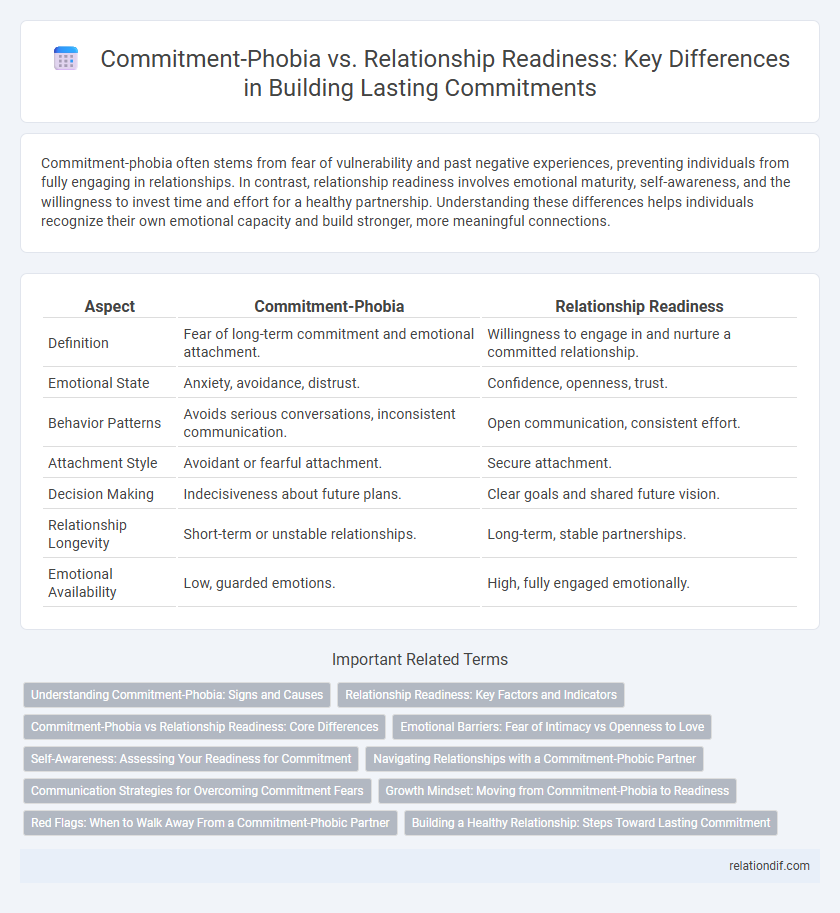Commitment-phobia often stems from fear of vulnerability and past negative experiences, preventing individuals from fully engaging in relationships. In contrast, relationship readiness involves emotional maturity, self-awareness, and the willingness to invest time and effort for a healthy partnership. Understanding these differences helps individuals recognize their own emotional capacity and build stronger, more meaningful connections.
Table of Comparison
| Aspect | Commitment-Phobia | Relationship Readiness |
|---|---|---|
| Definition | Fear of long-term commitment and emotional attachment. | Willingness to engage in and nurture a committed relationship. |
| Emotional State | Anxiety, avoidance, distrust. | Confidence, openness, trust. |
| Behavior Patterns | Avoids serious conversations, inconsistent communication. | Open communication, consistent effort. |
| Attachment Style | Avoidant or fearful attachment. | Secure attachment. |
| Decision Making | Indecisiveness about future plans. | Clear goals and shared future vision. |
| Relationship Longevity | Short-term or unstable relationships. | Long-term, stable partnerships. |
| Emotional Availability | Low, guarded emotions. | High, fully engaged emotionally. |
Understanding Commitment-Phobia: Signs and Causes
Commitment-phobia often manifests as a persistent fear of long-term relationships, marked by avoidance of emotional intimacy and repeated relationship sabotage. Common signs include reluctance to define the relationship, frequent breakups, and anxiety about future planning with a partner. Causes stem from deep-rooted issues such as past trauma, fear of vulnerability, or attachment insecurities, all of which hinder readiness for stable, committed relationships.
Relationship Readiness: Key Factors and Indicators
Relationship readiness involves emotional stability, self-awareness, and clear communication skills, essential for fostering trust and intimacy. Indicators include the ability to set healthy boundaries, prioritizing mutual respect, and demonstrating consistent effort toward relationship goals. Recognizing readiness reduces commitment-phobia by aligning personal growth with relational demands.
Commitment-Phobia vs Relationship Readiness: Core Differences
Commitment-phobia centers on fear and avoidance of long-term emotional bonds, often driven by past trauma or fear of loss, leading to evasive behavior in relationships. Relationship readiness reflects emotional maturity and self-awareness, enabling individuals to engage genuinely and sustainably in partnerships. Key differences lie in mindset and emotional capacity: commitment-phobic individuals resist attachment, while those ready for relationships embrace responsibility and vulnerability.
Emotional Barriers: Fear of Intimacy vs Openness to Love
Fear of intimacy often creates emotional barriers that prevent individuals from fully engaging in relationships, leading to commitment-phobia. Relationship readiness involves overcoming these fears by fostering openness to love and vulnerability, which enhances emotional connection and trust. Understanding the differences between avoidance of closeness and willingness to invest emotionally is crucial for successful long-term partnerships.
Self-Awareness: Assessing Your Readiness for Commitment
Understanding commitment-phobia involves recognizing fears tied to vulnerability and loss of independence, whereas relationship readiness depends on emotional maturity and stable self-concept. Self-awareness is critical for assessing commitment readiness by evaluating personal values, past relationship patterns, and emotional availability. Regular self-reflection and honest communication with oneself help identify readiness levels and potential barriers to building lasting relationships.
Navigating Relationships with a Commitment-Phobic Partner
Navigating relationships with a commitment-phobic partner requires understanding the underlying fears and emotional barriers that prevent long-term attachment. Recognizing signs such as avoidance of serious conversations, inconsistent communication, and fear of vulnerability can help tailor supportive strategies. Building trust through patience, open dialogue, and gradual emotional exposure enhances relationship readiness and fosters deeper connection.
Communication Strategies for Overcoming Commitment Fears
Effective communication strategies for overcoming commitment fears include open dialogue about individual values, needs, and past experiences to build trust and mutual understanding. Utilizing active listening and expressing emotions clearly helps partners address insecurities related to commitment-phobia. Consistent reassurance and setting realistic relationship expectations foster emotional safety, promoting readiness for deeper connection.
Growth Mindset: Moving from Commitment-Phobia to Readiness
Commitment-phobia often stems from fear of failure and fixed mindsets, which limit personal growth and relationship depth. Embracing a growth mindset fosters emotional resilience, encouraging individuals to view commitment as an opportunity for learning and mutual development. This shift enhances relationship readiness by promoting adaptability, open communication, and trust-building essential for lasting partnerships.
Red Flags: When to Walk Away From a Commitment-Phobic Partner
Identifying commitment-phobia in a partner involves recognizing red flags such as evasiveness about future plans, reluctance to define the relationship, and consistent avoidance of emotional intimacy. Relationship readiness requires emotional availability and willingness to engage in open communication, contrasting sharply with commitment-phobic behavior that often triggers insecurity and instability. Walking away from a commitment-phobic partner is crucial when these patterns lead to repeated cycles of withdrawal and unmet expectations, undermining trust and long-term relational growth.
Building a Healthy Relationship: Steps Toward Lasting Commitment
Building a healthy relationship requires understanding the difference between commitment-phobia and genuine relationship readiness, where emotional maturity and clear communication play crucial roles. Consistently expressing trust, setting realistic expectations, and embracing vulnerability establish a strong foundation for lasting commitment. Prioritizing self-awareness and mutual respect helps partners navigate challenges and deepen their connection over time.
commitment-phobia vs relationship readiness Infographic

 relationdif.com
relationdif.com